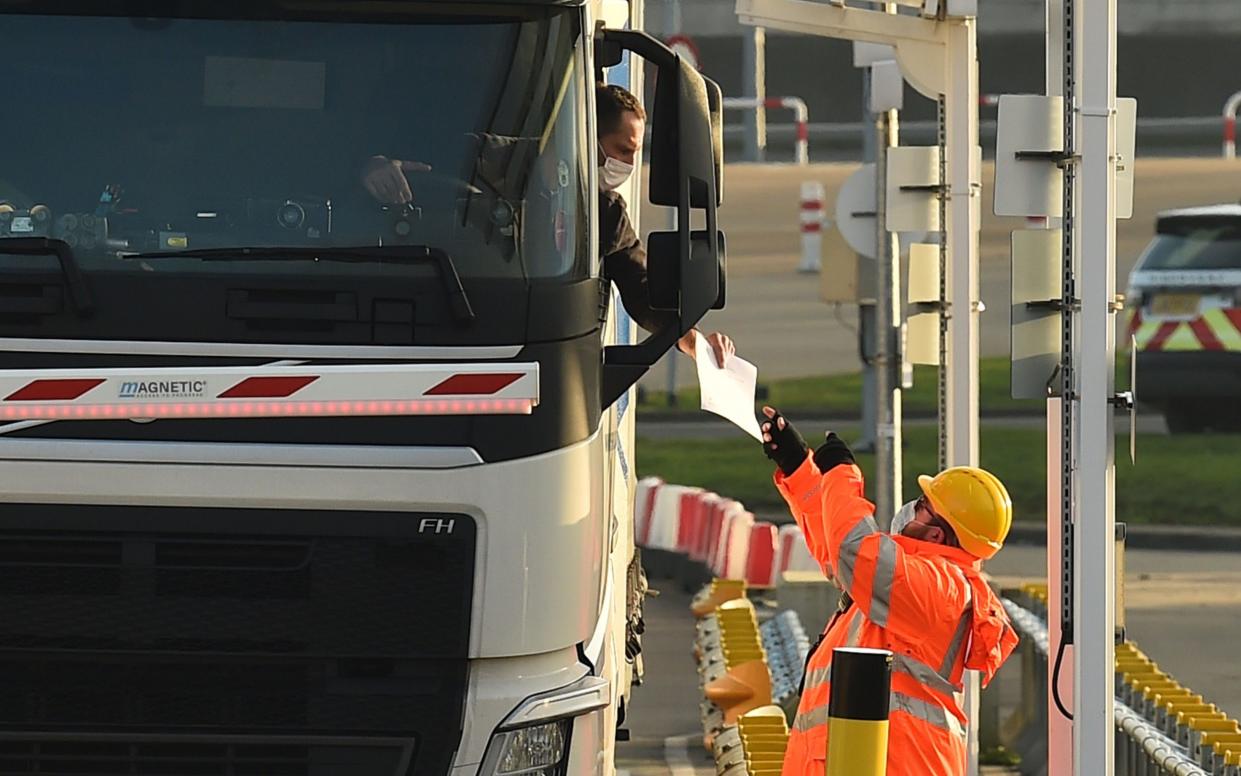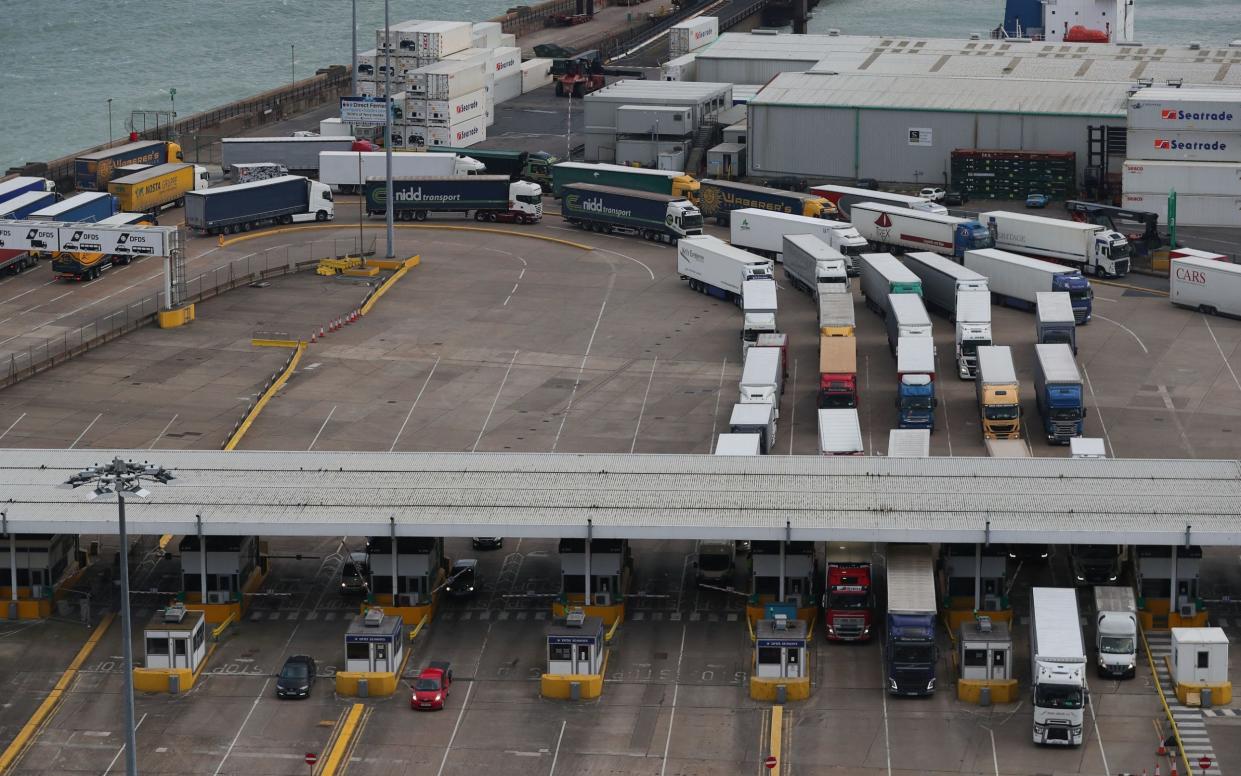Brexit border checks quietly scaled back over fears of queues

Brexit border checks expected to be introduced at the end of the month have been quietly scaled back amid fears they would spark huge tailbacks at ports.
Ministers have announced that they will introduce long-delayed new customs controls covering swathes of goods entering Britain from April 30.
But in an update on Friday, they revealed that physical inspections will at first only be carried out on products that “pose the most risk” of spreading disease.
Business leaders criticised the Government amid uncertainty over the level of bureaucracy that they will face, describing the situation as “complete disarray”.
The EU introduced full checks on British goods the day after Brexit, but the UK did not reciprocate over fears of chaos at ports, especially Dover.
Officials drew up plans for a new “world-class” border system, but it was delayed five times before the first phase was finally implemented in January.
The second part of the project is set to come into force at the end of this month, mandating extra inspections and paperwork for “medium-risk” products.
It means that importers of food such as cheese, salami and fish will have to pay up to £145 per consignment for additional health checks.

At the start of the year, ministers introduced paperwork for goods arriving from the EU that “present a ‘medium risk’ to biosecurity and health”.
They said that “documentary, physical and identity checks at the border for medium-risk animal products, plants and plant products” would follow from April 30.
But in the update published on Friday, the Government said that “the priority for physical checks from day one will be on the highest risk goods”.
Officials said that some medium-risk goods will be inspected if they “pose the most risk to UK biosecurity”, adding it will take time to “build up to full check rates”.
They insisted that it had always been the intention to phase in the new bureaucracy to minimise disruption for businesses that import from Europe.
Ministers also angrily denied a report in the Financial Times that they were not planning to “turn on” new controls over fears of long tailbacks at Dover.
The newspaper reported that the Department for Environment Food and Rural Affairs (Defra) had briefed ports that check rates would be “set to zero for all commodity groups”.
Phil Pluck, the chief executive of the Cold Chain Federation, said that the “ongoing confusion” made planning for the checks incredibly challenging.
He said: “A phased approach is the right one but businesses urgently need clear information about what exactly these phases will include, and a definitive timeline.”
Johnson criticises Sunak on Brexit failures
It came as Boris Johnson condemned the Government for having “killed” its free trade deal with Canada and failing to take full advantage of “Brexit freedom” in negotiations.
The former prime minister criticised Rishi Sunak’s Windsor Framework for having led to the breakdown of negotiations, claiming the UK’s approach was “ridiculous, unnecessary and cowardly”.
Writing in his Daily Mail column, he said: “We have killed (and I mean killed) the free trade deal with Canada because we no longer have the nerve to deviate from EU policy on hormone-treated beef, not out of respect for our farming interest, but out of fear of Brussels.”
He wrote that as a result of the Windsor Framework, the UK is being “forced into dynamic alignment” with the EU because of the need for Northern Ireland to accept the same sanitary standards as the bloc.
He added: “We have kicked over the table and walked out of the talks, so that British cheese makers and car makers now face swingeing and job-destroying tariffs, and millions of consumers on both sides of the Atlantic will have to absorb yet higher prices; and all because — wait for it — our government will not allow British people to eat so much as a morsel of Canadian beef.”
At the beginning of the year, Kemi Badenoch, the Business Secretary, halted the post-Brexit deal discussions over a row about exports of British cheese and imports of beef from Canada to the UK.
New system ‘in complete disarray’
Martin McTague, the national chairman of the Federation of Small Businesses, warned that the new checking system “is in complete disarray” with companies “unsure who they can trust”.
He said: “Many have invested considerable time and money making sure they’re getting it right, but now they’re left scratching their heads at the conflicting messages coming out of Whitehall – will they or won’t they face these checks and have to start paying on April 30?”
Defra said that it has “full confidence that the facilities, infrastructure and systems at the border will be ready for the April 30 implementation date of new border checks”.
A Government spokesman added: “Checks are commencing from April 30 and, as we have always said, the medium and high-risk goods posing the greatest biosecurity risk are being prioritised as we build up to full check rates and high levels of compliance.
“Taking a pragmatic approach to introducing our new border checks minimises disruption, protects our biosecurity and benefits everyone – especially traders.
“We are confident we have sufficient capacity and capability across all points of entry to handle the volume and type of expected checks.
“It is important to remember the cost of our border checks is negligible compared to the impact of a major disease outbreak on our economy and farmers.”
The third and final phase of checks, which will introduce safety and security declarations for all goods entering from the EU, is set to come into force on Oct 31.


